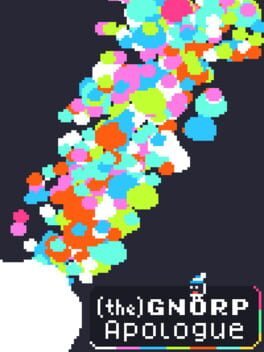I have a love/hate relationship with idle games, and the hate portion can be summed up with my ardent belief that the creator of NGU Idle shouldn't be allowed near a computer ever again. The ideal idle experience for me is one that takes the purity of manipulating numbers that all other genres obfuscate and mashes it with engaging upgrades, strategy, and an endearing concept. First and foremost, Gnorp Apologue is on the good side of incremental gaming. It has a very simplistic art style, with your little hardworking gnorps being like 6x5 pixels, but it's fun and satisfying to see those busybodies busybodying around, doing your bidding. Certain upgrades and gnorp professions have synergies which keep you strategizing and not just blindly clicking upgrades, but at the same time it's relatively forgiving; at worst, a bad strategy will have you waste some time.
Here we come to the elephant in the room: does this game respect your time? Yes and no. I truly believe the ideal idle game not only possesses the qualities I listed above, but can also be completed within less than a day of play. All idle games I've played that pass this time limit I find are extending their length beyond what interesting content they have. Prestiging is a basic concept of the genre, but so many have you go through an hours long cycle to make a tiny upgrade, and then you do it all again. Repeat for weeks of your life. Gnorp Apologue is definitely better than most at this - I still felt that I was experimenting and learning new things with each cycle even if all I got for my troubles was one or two more prestige points - but it's undoubtable that the rate of new content thrown at you lowers dramatically after the first few hours.
Here we come to the elephant within the elephant within the room (the first one was hungry): you have to pay for this game to play it. I think this game is worth the money, but all paid incremental games hit this wall. A game about manipulating numbers can only have so many systems and layers until it becomes ungodly complicated and/or require an unworthy amount of dev time. So the rate at which this content is introduced inevitably slows down at a certain point of complexity until you've prestiged enough times to beat it. It took me just over 17 hours (with a fair amount of idling) to do so. I believe if the numbers were fudged so that it took more like 10 hours instead, it would be a more consistently engaging experience. But I don't regret any time I spent with this game. After finishing, I went back to get some more prestige points to see the endgame of my overarching strategy, then got the rest of the achievements, which I don't do that regularly. So overall it won't change your opinion on idle games but, if your views on them align with mine, I think you'll get your money's worth. End of review. Nothing else to say. Nope.
gnorp
Here we come to the elephant in the room: does this game respect your time? Yes and no. I truly believe the ideal idle game not only possesses the qualities I listed above, but can also be completed within less than a day of play. All idle games I've played that pass this time limit I find are extending their length beyond what interesting content they have. Prestiging is a basic concept of the genre, but so many have you go through an hours long cycle to make a tiny upgrade, and then you do it all again. Repeat for weeks of your life. Gnorp Apologue is definitely better than most at this - I still felt that I was experimenting and learning new things with each cycle even if all I got for my troubles was one or two more prestige points - but it's undoubtable that the rate of new content thrown at you lowers dramatically after the first few hours.
Here we come to the elephant within the elephant within the room (the first one was hungry): you have to pay for this game to play it. I think this game is worth the money, but all paid incremental games hit this wall. A game about manipulating numbers can only have so many systems and layers until it becomes ungodly complicated and/or require an unworthy amount of dev time. So the rate at which this content is introduced inevitably slows down at a certain point of complexity until you've prestiged enough times to beat it. It took me just over 17 hours (with a fair amount of idling) to do so. I believe if the numbers were fudged so that it took more like 10 hours instead, it would be a more consistently engaging experience. But I don't regret any time I spent with this game. After finishing, I went back to get some more prestige points to see the endgame of my overarching strategy, then got the rest of the achievements, which I don't do that regularly. So overall it won't change your opinion on idle games but, if your views on them align with mine, I think you'll get your money's worth. End of review. Nothing else to say. Nope.
gnorp
